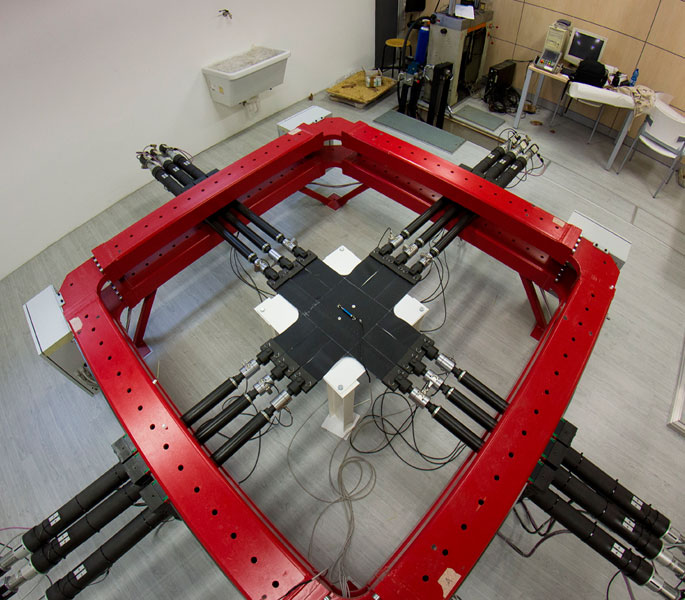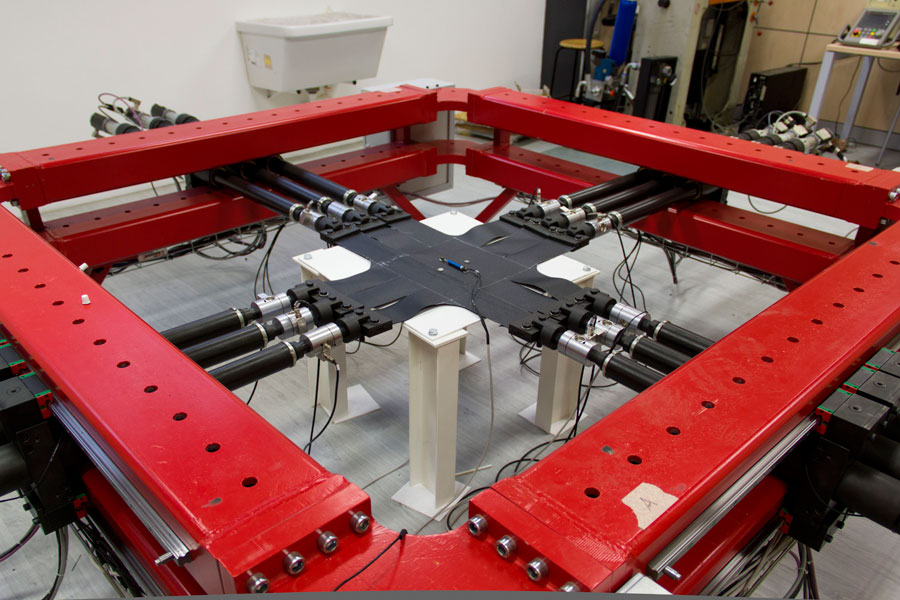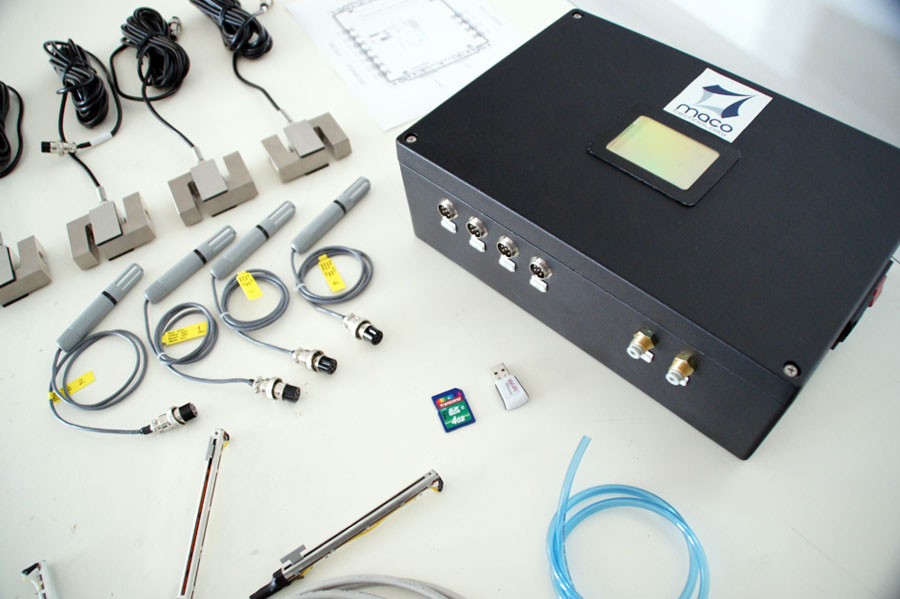CONSULENZA TECNICA E PERIZIE


Maco Technolgy ha un’ampia esperienza nello sviluppo di apparecchiature di prove biassiali per film e tessuti. Le recente collaborazioni con diverse università e centri di ricerca in tutta Europa hanno portato alla realizzazione di due prodotti progettati per massimizzare il livello di accuratezza e flessibilità o per minimizzare i costi di realizzazione in modo da rendere l’apparecchiatura di prova accessibili alle aziende e agli studi di progettazione operanti nel settore.
Sistema a telaio con batterie di attuatori indipendenti
La macchina biassiale fornita al Politenico di Milano nel 2011 è stata sviluppata a partire dal concept utilizzato da Max Losch e Rainer Blum migliorandone la flessibilità grazie ad una maggiore corsa degli attuatori e ad un accurato controllo software.

L’apparto di prova è basato su un telaio rigido di forma quadrata equipaggiato, su ogni lato, con una serie di tre attuatori indipendenti progettati per film e tessuti tecnici per applicazioni strutturali. Il telaio ha una dimensione interna netta di 1,852 mm ed è stato progettato per una forza massima di 140 kN su ogni lato. La forza di trazione è applicata in modo assiale grazie ai particolari snodi utilizzati: ogni attuatore è infatti montato su carrelli a basso attrito e un perno verticale che gli permettono di scorrere lungo i lati del telaio e di allinearsi al campione cruciforme. Gli attuatori sono composti da un motore brushless, un riduttore epicicloidale e una vite a ricircolo di sfere in grado di sviluppare una forza compresa tra 1N e 25kN per ogni morsetto di afferraggio del tessuto (largo 100mm), con una velocità massima di 240 mm/min e una corsa complessiva di 512 mm.
Ogni attuatore è fornito di una cella di carico per misurare la forza applicata in un intervallo tra 1N e 25kN e, di conseguenza, controllare gli spostamenti degli attuatori. L’allungamento nell’area centrale del campione è misurato da grazie a estensimetri a contato (quatto potenziometri lineari Penny and Giles SLS095/ 0030/1.2K/R/50 con una dimensione iniziale di 90 mm e una corsa massima di 30 mm). Il campione a croce ha un’area centrale di 300 mm x 300 mm ed ogni braccio laterale è suddiviso in tre strisce da 100 mm di larghezza e 200 mm di lunghezza a cui si aggiungono 100 mm per il materiale necessario per il sistema di afferraggio. La parte terminale di ogni striscia è avvolta attorno and una barra dalla sezione a cuneo successivamente stretta tra due piastre di afferraggio.
Sistema di tensionamento di tipo simmetrico con un attuatore per lato
Questa macchina di prova biassiale è il risultato di un progetto di ricerca tra Maco Technology srl, l’Università di Nottingham e Holscot Fluoroplastics Ltd con lo scopo di investigare le possibilità offerte di microcontrollori Raspberry-Pi al fine di sviluppare un dispositivo di prova di tipo economico per film e tessuti per applicazioni strutturali.

Il dispositivo di prova è composto da un data logger, in grado di acquisire diversi canali simultaneamente, un telaio metallico 130cmx130cm per campioni di tipo cirriforme con una dimensione massima di 90cmx90cm, un’area centrale di 300mmx300mm e bracci da 300mm. Ogni lato del campione, avvolto attorno ad una barra che ne impedisce lo scivolamento, è trattenuto da un keder di alluminio di 50 cm di larghezza. Il carico è applicato manualmente tramite una barra filettata, tuttavia, il sistema può essere implementato con attuatori controllati direttamente dal microcontrollore Raspberry-Pi. La forza applicata viene misurata da celle di carico di tipo ad S (Phidget CZL301) progettate per una forza massima di 5kN. L’allungamento del campione e misurato tramite tre potenziometri lineari (Alps RSA0N11S9002) con una corsa massima di 100mm. I valori di forza e allungamento vengono acquisiti simultaneamente e successivamente utilizzati per ricavare le curve (o superfici) di sforzo-deformazione comunemente adottate nello studio delle proprietà meccaniche di film e tessuti. In aggiunta, il data logger ha quattro canali dedicati all’acquisizione della temperatura e umidità e due sensori per la misurazione della pressione (0-5 Psi).
Maco Technolgy srl has an extensive experience in the development of biaxial testing machines for fabrics and foil. The recent collaboration with several European universities and research centers resulted in two different products designed to maximize the accuracy and the flexibility of the testing ring or to minimize the manufacturing costs making the testing equipment affordable for manufacturing companies and engineering firms working in this sector.
Rigid square frame with batteries of independent actuators
The biaxial machine supplied to Politecnico di Milano in 2011 has been developed on the basis of the concept used by Max Losch and Rainer Blum and improved with a larger stroke and a more accurate controlling software. The testing equipment represents the current state of the art for architectural fabrics in terms of size, accuracy and flexibility.
The testing apparatus is based on a rigid square frame with batteries of independent servomotors, three per side, designed for fabrics and foils used in structural applications. The square frame, with a net internal distance equal to 1,852 mm, is designed for an estimated maximum force of 140 kN on each side. The axiality of the forces applied by the actuators is guaranteed by their kinematics: each of them is free to move along the side of the frame and free to rotate around an axis perpendicular to the sample plane. The movement along the frame is allowed by the presence of two low friction rollers for each actuator, which are free to move along the rail placed on each side of the frame. The actuators are based on a brushless motor, a Planetary Gearbox and a ball screw and provide a tension force between 1 N and 25 kN for each clamp (100 mm wide), with a maximum speed of 240 mm/min and a maximum stroke of 512 mm. Each actuator is equipped with a force transducer which measures the force applied in the range from 1 N to 25 kN, allowing accurate control of the linear displacements of the actuator. Elongations (and hence strains) in the zone of interest are measured through contact extensometers, four linear potentiometers Penny and Giles SLS095/ 0030/1.2K/R/50 with a closed size of 90 mm and a maximum stroke of 30 mm. The cruciform samples have a central square of 300 mm x 300 mm and each arm is divided into three strips 100 mm wide and 200 mm long, with additional 100 mm of material used for the clamping system. The end of each strip is folded over a wedge-shaped bar which is then clamped between two plates.
Symmetrical loading systems with one actuator on each side
This biaxial machine is the result of a research project between Maco Technology srl, University of Nottingham and Holscot Fluoroplastics Ltd aimed to investigate the potential of a Raspberry-Pi micro-controller in the development of cost effective test equipment for the investigation of the mechanical performance of architectural coated fabrics and foils.
The testing device is composed by a data logger, able to record several channels simultaneously, and a metal rig 1300mmx1300mm able to test a cruciform sample 900mmx900mm with a central area of 300mmx300mm and arms 300mm long. Each side of the sample, which is previously folded over a cylindrical bar which prevents any slippage, is held by an aluminum keder rail 50cm wide. The load is applied manually through a threaded bar, however, the next development of the biaxial machine aims to include actuators directly controlled by the Raspberry-Pi micro-controller.
The force is measured by means of up to four S type load cells (Phidget CZL301) designed for a maximum force of 5kN. The elongation of the material is measured through up to three linear potentiometers (Alps RSA0N11S9002) with a maximum stroke of 100 mm. The data of force and elongation are recorded simultaneously and are then used to develop the stress-strain response curves (or surfaces) used for the investigation of the mechanical performance of the material. In addition, the data logger has four channels for the measure of temperature and humidity and two sensors for the measure of pressure (0-5 Psi).
